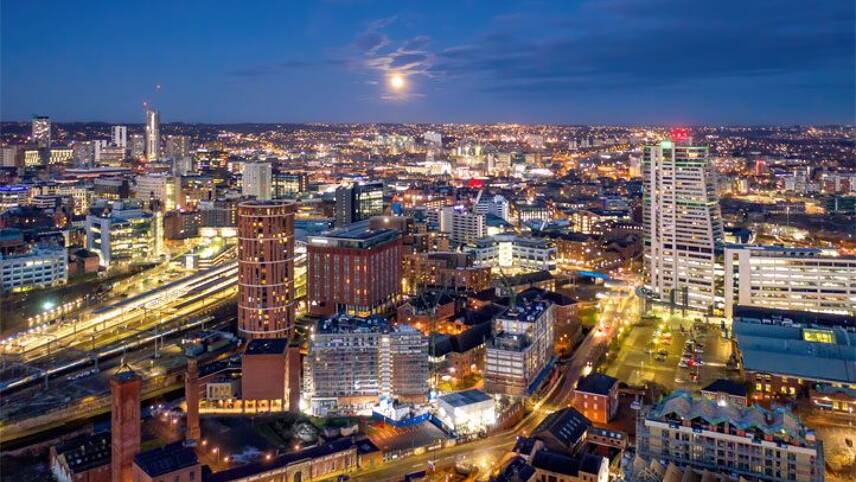Register for free and continue reading
Join our growing army of changemakers and get unlimited access to our premium content

Leeds (pictured) has declared a 'climate emergency' and set a 2030 net-zero target
The BBC wrote to all 149 of England’s ‘top-tier’ councils between March and June, receiving 136 responses. Of the 136 responding councils, 121 confirmed they had made a ‘climate emergency’ declaration.
Councils were also asked to disclose the major infrastructure projects in their pipelines. Of the 121 with ‘climate emergency’ declarations, more than one-third (37%) are supporting a project that could potentially increase emissions in the local area, including road building or airport expansion.
Airport expansions, for instance, are planned at locations including Leeds and Bristol – both city-regions which have made ‘climate emergency’ declarations and set out local strategies to reach net-zero ahead of the national 2050 deadline. In Leeds, the council has supported the expansion. In Bristol, North Somerset Council voted to reject Bristol Airport’s plans in early 2020, but an inquiry into this decision began last month.
Councils with ‘climate emergency’ declarations but are backing major road expansion plans include Tower Hamlets and Shropshire. More than 50 new road-building projects are being supported by the Government’s second Road Investment Strategy (RIS2), which is, itself, subject to a court challenge from green campaigners.
The BBC also asked councils about the impact of Covid-19 on their climate action plans. Almost two-thirds (65%) said the pandemic had had an adverse effect on their ability to deliver low-carbon schemes.
Call to action
The Local Government Association has used the BBC’s findings to call for more clarity on – and higher levels of – long-term funding for councils.
Friends of the Earth has also expressed anger at the findings, stating that councils “will be left unable to meet ambitious climate targets set locally, as well as those internationally agreed by the Prime Minister” without additional funding, powers and resources.
The group is calling for RIS2 to be scrapped and for the funds to be re-allocated to councils looking to develop better infrastructure for public transport, walking and cycling.
It also wants the UK Government to ensure that local authorities are legally required to set and deliver climate targets in line with climate science, considering them in all planning decisions. Whitehall would also need to provide councils will more funding to support this aim.
The Government’s next big chance to enact such a change will be with the publication of the Net-Zero Strategy this autumn. Friends of the Earth wants this Strategy, and/or the Heat & Buildings Strategy, to outline measures for councils to decarbonise their biggest sources of emissions, including buildings.
“Ministers should put councils at the heart of their climate strategy, so they can fulfil their potential to create the green jobs and healthy, resilient communities needed for the challenges of the 21st century,” said Friends of the Earth campaigner Sandra Bell.
The calls to action build on a recent report from the National Audit Office (NAO), which concluded that councils are finding it hard to engage with the UK Government on net-zero target setting and with securing funding for low-carbon activities. That report came in the same week that some 30 mayors and council leaders co-signed a communique urging the Government to grant them additional funding and powers to transition to net-zero, orchestrated by UK100.
A spokesperson for the Ministry of Housing, Communities and Local Government said: “We have already provided billions in funding for councils to deliver local action on climate change, including through the Public Sector Decarbonisation Scheme, the On-Street Residential Chargepoint Scheme and the Green Recovery Challenge Fund.”
The spokesperson confirmed that the Net Zero Strategy will include more detail on how the Government will support councils.
Sarah George


Why do people look negatively on new road building. Don’t electric cars need something hard to drive on. Once range anxiety has been overcome by larger capacity batteries and a solid charging infrastructure there as a back up people will use electric cars just as much as their petrol or diesel ones. Airport expansion is a bigger challenge to justify.